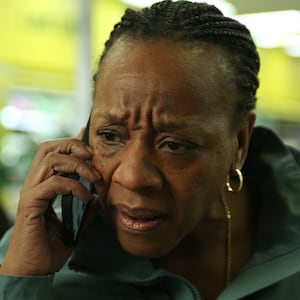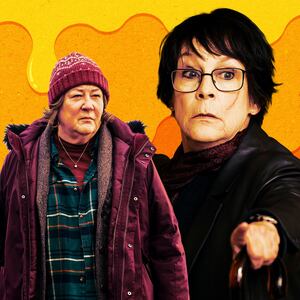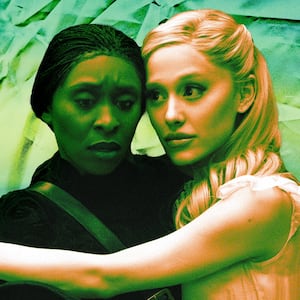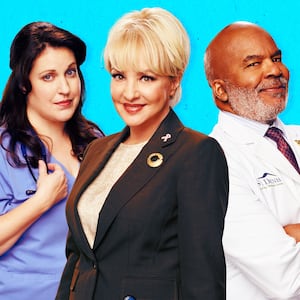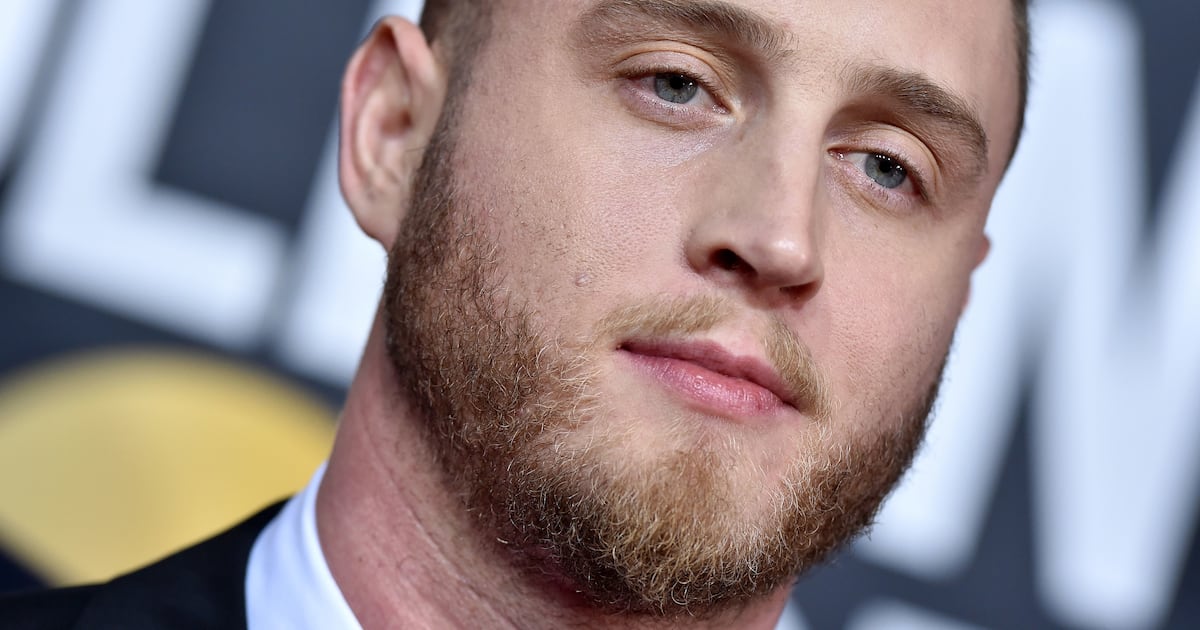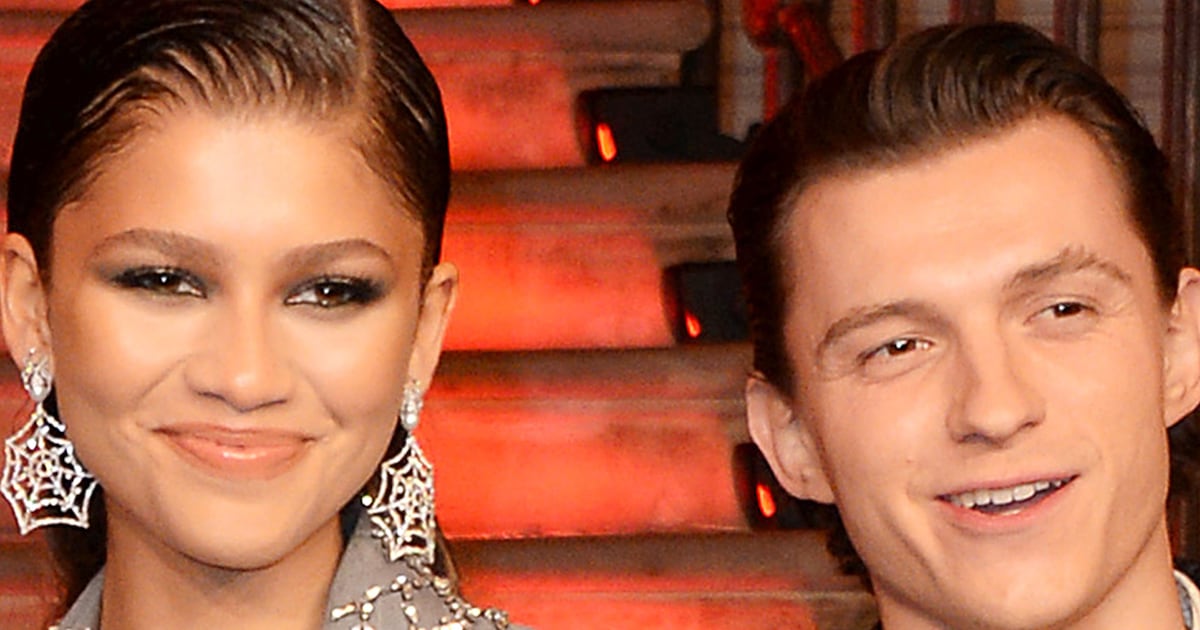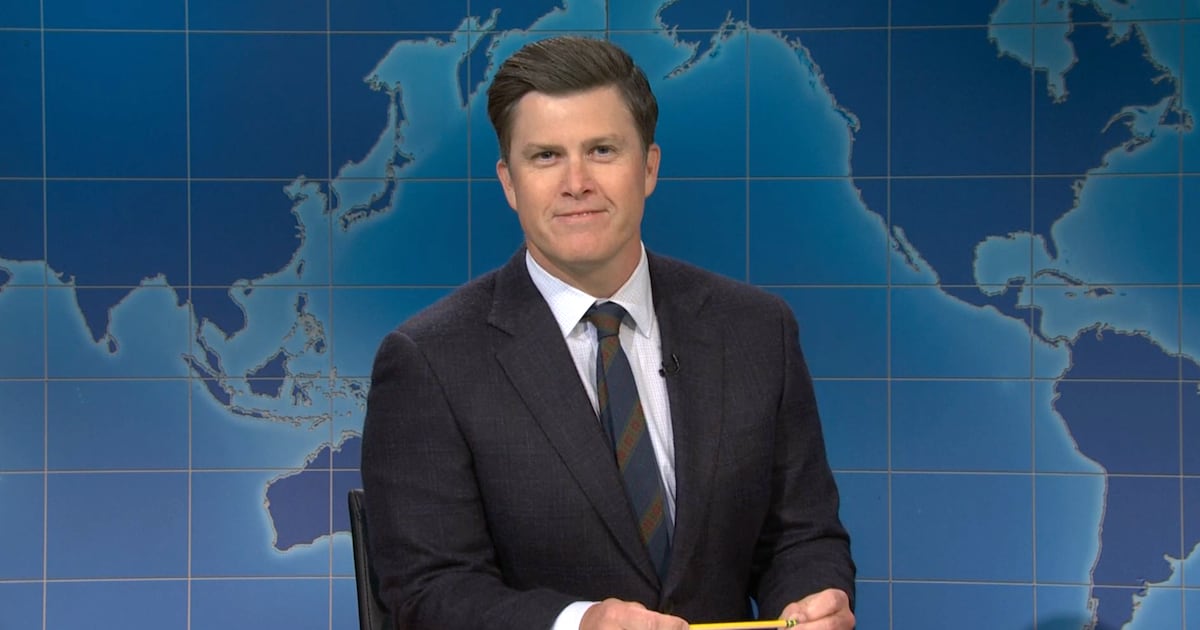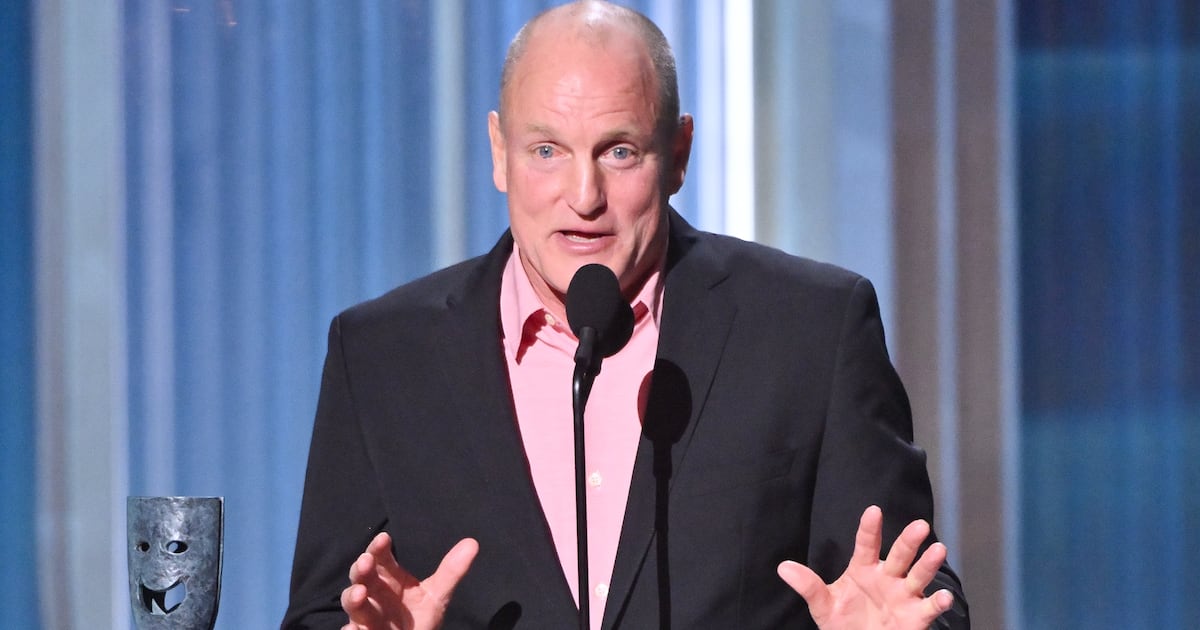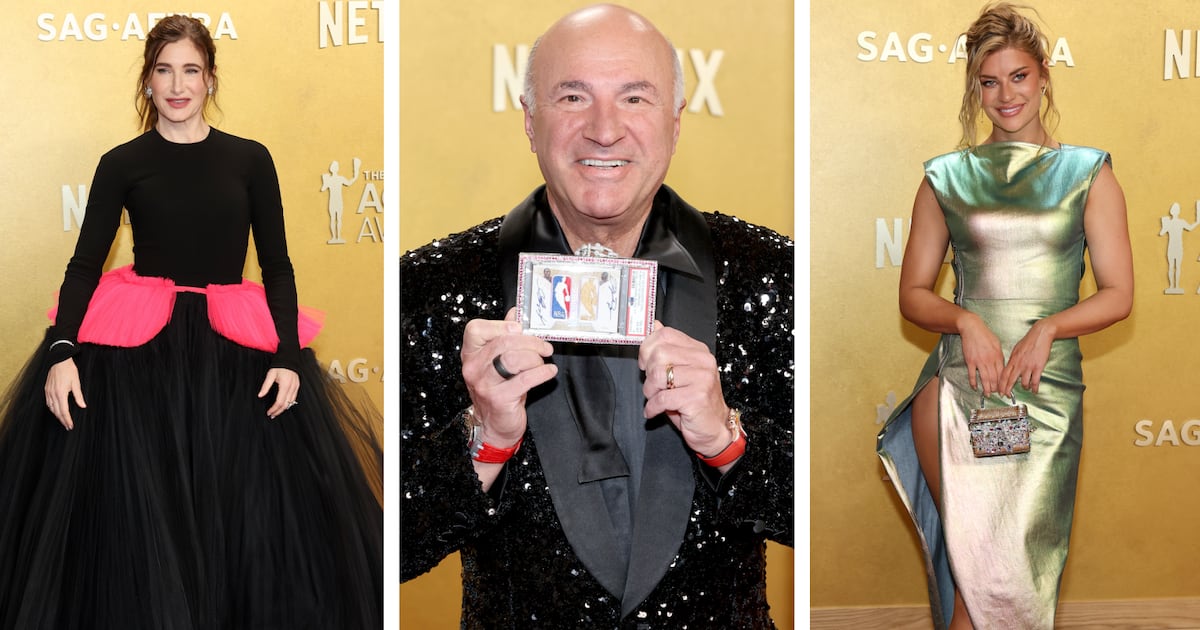The Act of Killing, Joshua Oppenheimer’s 2012 documentary about the 1965-1966 genocide in Indonesia, is one of this millennium’s true masterpieces, and its 2014 companion piece The Look of Silence is equally phenomenal. Thus, expectations have been sky-high for the director’s follow-up, which turns out to be not only a work of fiction, but an all-out musical.
The End, which hits theaters Dec. 6, is everything admirers could have hoped for and more: a complex, deft, and deeply affecting story about the aftermath of the end of the world, set in an underground bunker that’s home to a family—Mother (Tilda Swinton), Father (Michael Shannon), and Son (George MacKay), who’s never seen the light of day—and their compatriots Doctor (Lennie James), Friend (Bronagh Gallagher), and Butler (Tim McInnerny).
Survivors of an eco-apocalypse that, it’s slowly revealed, was partly their fault, they’re an insulated clan whose confinement proves a reflection of their self-imposed imprisonment in an alternate reality of lies, deception, and propaganda—all of which is threatened by the unexpected arrival of Girl (Moses Ingram), a stranger whose presence has disquieting effects on her hosts.
From its dexterous cinematography and complicated performances to its bevy of moving musical numbers, The End is a swing for the fences, and Oppenheimer connects in every respect. Though superficially divorced from his prior non-fiction efforts, his latest is another saga about the ways in which victors live with their crimes, rewrite history to soothe their consciences and maintain order, and coerce their victims into acquiescence and complicity.
Boasting songs with lyrics written by the director, the film is unlike anything else this year, and its power and intricacy grows as Girl’s intrusion disrupts the subterranean family’s status quo in ways that are anything but predictable. Eschewing judgmental finger-wagging in favor of conflicted emotional and psychological messiness, it’s an operatic triumph.
The End confirms that Oppenheimer is one of modern cinema’s giants—a daring artist willing to wrestle with profound, multifaceted issues devoid of easy answers. Consequently, there was much to discuss when we sat down with the auteur in advance of his film’s theatrical debut, from his guiding thematic preoccupations, to his fondness for song-and-dance movies, to the way in which The End speaks to our current perilous moment.
The End isn’t just a move into fiction filmmaking for you—it’s a bona fide musical. Was that always the career plan?
[laughs] No, it wasn’t. But the musical genre has always been in the background because my theme is delusion. I’m American, and the musical is the quintessential American genre of a kind of false hope—a despair that masquerades as hope. I say that because I think when there’s a sense of powerlessness or fear, which was also present in the depression and in the ’40s and ’50s under McCarthy, that wolf of despair can masquerade in the sheep’s clothing of hope and optimism.
That’s, in a way, my theme, and it was there in the background while making The Act of Killing. With that film, we have these seemingly unrepentant but broken death squad leaders making a musical. That was the little pitch or tagline in my head, even though they did much more than make a musical. So when I turned to fiction and was looking at the same theme of self-deception, the musical became the natural genre for exploring that.

What was the specific genesis of The End?
I wanted to make a third film in Indonesia about the oligarchs who enriched themselves on the back of the genocide—who took advantage of the fact that the entire country was terrified of them to get away with murder in the building of their empires. But I couldn’t return to Indonesia after I made The Act of Killing. I’d already shot The Look of Silence, but I hadn’t shot this idea for a third film.
So I started investigating oligarchs elsewhere. There was one family, an oil tycoon elsewhere in Asia, who had sponsored mass violence to obtain his oil concessions and to suppress protest around his oil installations. This family was buying a bunker, and I visited it with them. It wasn’t finished yet; it needed decoration. But it was going to have many of the same facilities you see in The End: a vault for their art collection; a huge garage for their luxury cars; underground gardens; a pool, and a wine cellar.
Oh, that’s fascinating.
I wanted to ask them, how would you cope with the guilt over a catastrophe from which you’d be fleeing? How would you cope with the remorse for the loved ones you’d leave behind? How would you tell your story to a generation you’d raise in this place? And how would that be a way of whitewashing your past to make it easier for you to live with?
Did you think such a conversation was possible?
Even though I didn’t know them well enough to ask these questions, and even if I knew that if I did ask, they wouldn’t answer them honestly, I did know I’d like to film this family 25 years after they moved in to see how these unanswerable questions created these lacunae, these silences—how they hollowed out their ability to communicate and love each other. What diminished version of a family would they become?
I then thought, in that would be an allegory for all our families, because we all have things we find difficult to acknowledge. Ways we hurt people we love. Ways we’re afraid to apologize. We all know what it’s like to manipulate the people we love so that those sensitive topics don’t come up. We all know what it’s like to watch relationships that were once abloom with possibility kind of wither because the silences took over. I sensed there was something to say about the trajectory of the human family and each of our families. That I could make an allegory where the characters are nameless because they’re all of us, and to have this superimposition of the macroscope and the microscopic in every moment.
How did those ideas, and questions, lead you to make The End as a musical?
Going back to this experience with this family, as I left the bunker that day, and on my way home on the airplane, I watched one of my very favorite films on my laptop, which is The Umbrellas of Cherbourg—not because I thought it was relevant, but just because I needed a break from what I had seen. I needed something beautiful, and there is an empathy for everyone in that film. They hurt each other, but everyone is doing the best they can. I thought, you could tell the story of this family, every family, humanity, where we are now, with everyone, in which you defend every character. Where everyone’s doing the best they can.
After watching that film, it came to me as a package. I will make a musical. It will be called The End. The family will be American because this is an American genre. It will take place 25 years after the family’s moved into the bunker. And it’ll be, in a certain sense, the start of a new career for me.
No matter their flaws and failings, was it important to show empathy for these characters?
What motivates me to film anyone is a desire to hold them so tightly in an empathic embrace that I can feel what it’s like to be them. It was there in documentary for me. It was there with this. It was there in the communion I felt with the cast in our month of rehearsals as we dug into who these people are and sought to defend them and their choices. It’s so core to what I do.

That is certainly true.
I wanted the film to be explicit about the political situation we’re in and where I think we’re headed toward catastrophe, probably because of climate change or the violence that might emerge as a result of climate change, and the dislocation and mass migration that might emerge as a result of climate change, which could lead to war and the breakdown of society. But then it’s about being attuned to the characters.
Yes, the father is an oil man, because I want the film to implicate our collective blindness and cognitive dissonance—our denial of what’s happening. Even if you and I acknowledge all the science which is telling us that we’re headed toward catastrophe, the moment we finish this interview and move on to the next thing in our day, we will proceed as if that is not the case. I’m not talking about people who deny climate science; I’m talking about people who embrace it. In order to function in our society, there’s a cognitive dissonance where we don’t really believe it, or we would be changing our lives in a much more fundamental way.
In your view, then, we’re all partly guilty?
I want to implicate all of us. The characters are nameless because they are all of us. The father is an oil tycoon as a means of signaling that climate change is probably how we’re going to end up in this mess. It’s not a way of saying, the oil men are guilty and we’re innocent by contrast. My work is always about implicating. And the fact that it’s a musical—what gets them singing in this film are the crises of doubt when the stories they tell themselves start to fray and crumble as they’re confronted by the truth. What gets them singing is the desperate attempt to cobble together new stories.
The songs themselves, the melodies, are these luminously beautiful lies, and the truth screams through in the silences when they can’t sing anymore. I’ve woven the melodies through the piece so that when they start to sing, we are humming along unconsciously. The melodies reprise through the piece so that when they start lying to themselves, we’re humming along in our heads, and we are identifying with their self-deceptions. So absolutely, it’s all about defending them.

The film’s portrait of disinformation and revisionism feels very prescient in the context of Donald Trump’s re-election. Does his victory, and his success at recasting the Jan. 6 insurrection as a patriotic and peaceful “day of love,” prove that rewriting history—to excuse and exonerate misdeeds—is an inevitable tack taken by victors?
I said this when The Act of Killing came out, and it’s truer now, and the time to address this is shorter now, because we’re 12 years later: I think impunity is the story of our time, and maybe it’s the story of all time. It’s the story of history, because the dominant narrative is always written by the victors, and it is always written to absolve them of their crimes and their sins.
We also do that in our own lives. The film is all the more urgent in this truly perilous moment we’ve entered, and all the more resonant, because for those of us who thought the election would turn out differently, there was a rude awakening. Given the catastrophe the family faces in The End—that they’re singing “our future is bright” as they stare into the abyss and then fade away into a cosmos and the microorganisms that will succeed them—they are like Wile E..Coyote running off the edge of a cliff, telling themselves everything’s fine until they look down and realize they’re in freefall. That feeling is very familiar to all of us right now.
I’d say so.
I don’t think the situation is hopeless. It may be too late for the family in The End, but it is not too late for us. The film is a cautionary tale, and like all cautionary tales, it’s offered in the hope that people will heed it while there’s still time. The film is a labor of hope. It is an act of hope. The creation of it by me and the cast and crew—all of us put the years and resources it took to make this in order to say that there is still time. When you leave the cinema, there is still a sky.
What did you think about Jonathan Glazer mimicking The Act of Killing’s final moments at the end of The Zone of Interest?
A friend from Germany first told me about The Zone of Interest, and he sent along an interview with the actor [Christian Friedel] who plays [Rudolf] Höss. In that interview, the actor talked about watching The Act of Killing and studying Anwar’s retching to develop his performance. So maybe unfortunately, I knew it was something being mined. But I was very impressed by what an accurate portrayal it was. And I was honored.
When I was witnessing Anwar retching on the roof, I had an impulse to rush over to him and comfort him. It startled the camera operator and he kind of jumped, and we had to very painstakingly remove the wobble. I stopped myself because I realized, what would I say? I would go over and put my arm around him and say it’s okay at precisely the moment it’s not okay? I’m witnessing what it looks like when it is not okay. I’m watching what guilt does to a human body in a way that I’ve never seen before.

Did that moment directly inspire The End?
When we were shooting the scene with Father, when the penny drops for him and he realizes that he never really cared as much as he told his son he did, and that he’s guilty of huge acts of destruction and violence, we talked about The Act of Killing. About whether Michael should look for anything similar to what happened to Anwar. We both felt that authenticity is that which you instantly recognize as true because it’s not what you expect. That’s true for the actor too—at least an actor of Michael’s curiosity and courage.
We actively thought about it. We discussed, would it be interesting to do a take, or structure the scene around, a kind of mimicry of that? We realized, maybe also because I’m the director of The Act of Killing, that it would be an obvious and heavy-handed reference, and make The End smaller, because it would become derivative. So I chose not to do it.
The other thing I’d say is, I have a great admiration for The Zone of Interest, and I feel we have a different sensibility in the way we regard people. This is no value judgment; I’m not saying there’s anything greater or lesser. But that film, where it’s like surveillance and there’s a clinical distance…Having worked with people who are essentially mass murderers, and not only regarded them with love, but actually come to feel love—not friendship, but love—for some of them, as fellow human beings participating in the same human tragedy, there’s just a closeness and an intimacy and a love that’s the only way I know how to feel it’s worth looking at people with my camera.


